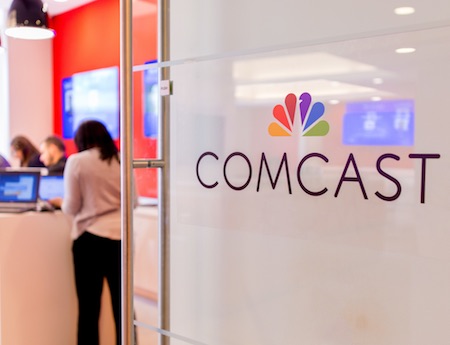Comcast Paying Record $2.3 Million to Settle FCC Investigation

The smarter way to stay on top of broadcasting and cable industry. Sign up below
You are now subscribed
Your newsletter sign-up was successful
The FCC's Enforcement Bureau says the nation's largest cable operators, Comcast, has agreed to pay the largest civil penalty assessed a cable operator—$2.3 million—to settle an investigation into whether it charged customers for services and equipment they did not authorize or so-called "negative option billing."
Comcast says it was already making fixes and has been "laser focused" on customer service.
“It is basic that a cable bill should include charges only for services and equipment ordered by the customer—nothing more and nothing less,” said Enforcement Bureau chief Travis LeBlanc. “We expect all cable and phone companies to take responsibility for the accuracy of their bills and to ensure their customers have authorized any charges.”
The FCC said it had received "numerous" consumer complaints about being charged for premium channels or set-top boxes or DVRs even though they had declined those services or had not ordered the equipment.
The cable operator will also be required to implement a detailed program for redressing disputed charges in a standardized and expedient fashion, and limits adverse action (such as referring an account to collections or suspending service) while a disputed charge is being investigated.
Comcast will send confirmation of any new products or charges separate from monthly bills. Comcast says it was already in the process of making such changes and agrees with the fixes.
Under the terms of the settlement, Comcast will implement a five-year compliance program to obtain "affirmative, informed consent" before charging for any new service or equipment.
The smarter way to stay on top of broadcasting and cable industry. Sign up below
It will also send confirmation of any new products or charges separate from monthly bills.
Comcast disputed the specific allegations' illegality, but agreed to the fine to terminate the investigation. "Comcast asserts that erroneous charges, including those occasioned by employee error, which do not involve deceit or the company’s intentionally 'duping' customers, cannot constitute prohibited negative option billing within the meaning of relevant authority or Commission precedent," the FCC said.
“We have been working very hard on improving the experience of our customers in all respects and are laser-focused on this," Comcast said in a statement. "We acknowledge that, in the past, our customer service should have been better and our bills clearer, and that customers have at times been unnecessarily frustrated or confused. That’s why we had already put in place many improvements to do better for our customers even before the FCC’s Enforcement Bureau started this investigation almost two years ago. The changes the Bureau asked us to make were in most cases changes we had already committed to make, and many were already well underway or in our work plan to implement in the near future."
"We do not agree with the Bureau’s legal theory here, and in our view, after two years, it is telling that it found no problematic policy or intentional wrongdoing, but just isolated errors or customer confusion. We agree those issues should be fixed and are pleased to put this behind us and proceed with these customer service-enhancing changes.”
At a June hearing on cable customer service and overcharges, Comcast SVP customer service Tom Karinshak was the first to testify, setting a general tone of contrition combined with pledges to do better and explanations of how that was already happening.
"Comcast and industry have not always made customer service the priority it should have been. I am sorry for that," he said. But he outlined the steps and investments Comcast had made and would make to improve the experience, including reassessing policies and fees.
“Public Knowledge heartily applauds the Commission for this essential enforcement action. For too long, Comcast customers have been charged for unordered services, speeds, and products and equipped that they do not want," said Kate Forscey, government affairs associate general counsel at Public Knowledge. "The Commission’s action today provides both relief and validation for Comcast customers everywhere, while sending an important message to the industry as a whole."
Contributing editor John Eggerton has been an editor and/or writer on media regulation, legislation and policy for over four decades, including covering the FCC, FTC, Congress, the major media trade associations, and the federal courts. In addition to Multichannel News and Broadcasting + Cable, his work has appeared in Radio World, TV Technology, TV Fax, This Week in Consumer Electronics, Variety and the Encyclopedia Britannica.

